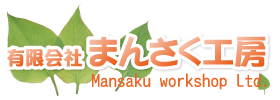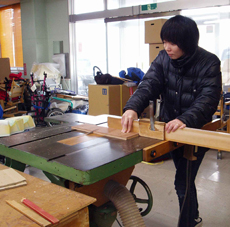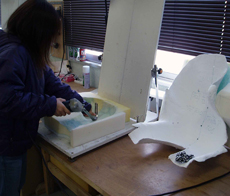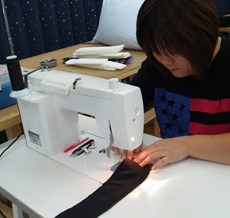Home > Q&A
Q&A
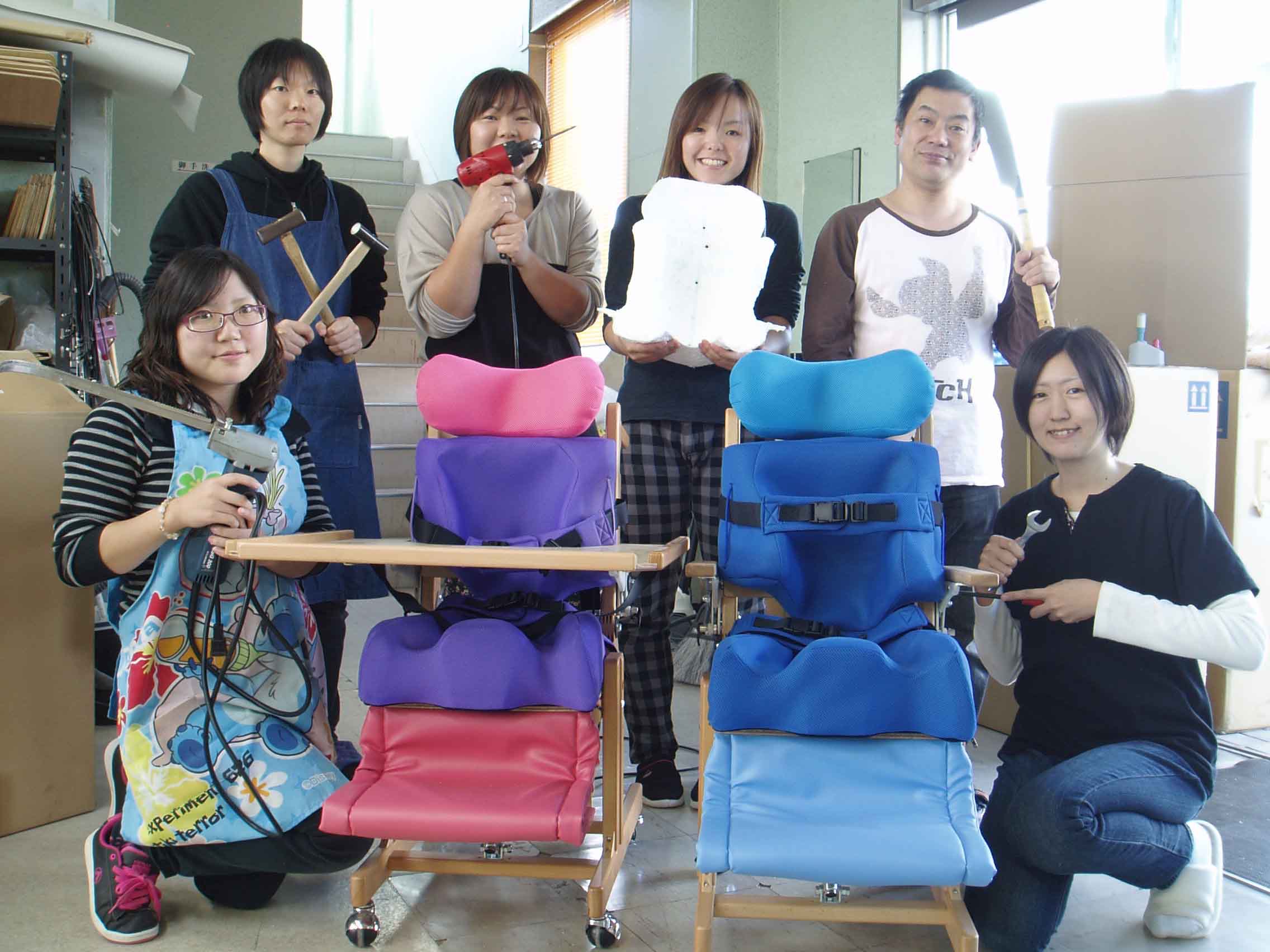
Q. What does your company do?
Mansaku workshop Ltd. is a company that manufacture and sell welfare equipments for people with disabilities. We help our clients to make their life more comfortable by comprehensively coordinating not only the best body posture and equipment for each client but also matching public welfare systems available for buying welfare equipment.
We sell made-to-order and ready-made products so we’re classified as a manufacturing or retailer, but considering the actual work we have characters as a company engaged in the field of medical and welfare.
We sell made-to-order and ready-made products so we’re classified as a manufacturing or retailer, but considering the actual work we have characters as a company engaged in the field of medical and welfare.
Q. What kind of products and services does your company offer?
We manufacture, sell, and coordinate any kind of welfare equipment that we can offer, but in reality, it is mostly offering something related to the "sitting position" such as wheelchair and seating system.
We sometimes offer ready-made products to our clients, but we mostly make them to order according to the state of each client.We also make wooden frame wheelchairs assuming they will be used in a room.
We sometimes offer ready-made products to our clients, but we mostly make them to order according to the state of each client.We also make wooden frame wheelchairs assuming they will be used in a room.
Q. What kind of people use your products?
Many people associate elderly people with "welfare equipment" and "wheel chair", but our clients are mostly physically challenged, especially children are over 90%.
There are various types of disabilities, but people who are difficult to walk or sit by oneself use our services.Some of them are difficult to hold their best position because of deformation of body and excessive or loss of muscle tension, who would be confined to bed at one time.
Deformation of the body and muscle trouble burden the internal organs and also affects diet, breathing, and life-sustaining.Our customers often ask us to produce wheelchair as a tool that helps them keep a better position more than as a tool to transfer.
There are various types of disabilities, but people who are difficult to walk or sit by oneself use our services.Some of them are difficult to hold their best position because of deformation of body and excessive or loss of muscle tension, who would be confined to bed at one time.
Deformation of the body and muscle trouble burden the internal organs and also affects diet, breathing, and life-sustaining.Our customers often ask us to produce wheelchair as a tool that helps them keep a better position more than as a tool to transfer.
Q. Why is sitting position important?
It is said that humans are encouraged to grow by receiving stimuli (information), but being bedridden makes it hard to get stimulus.To get stimulation, raising your head or facing forward, that is, "standing" or "sitting" is important.
Also, it is better to raise your head, face forward and see each other for doing any activities or good communication.You can expand the range of activities more and feel brighter as long as you are able to assume a sitting position even if you can’t stand.
Also, it is better to raise your head, face forward and see each other for doing any activities or good communication.You can expand the range of activities more and feel brighter as long as you are able to assume a sitting position even if you can’t stand.
Q. How do you receive an order?
Occasionally we get an order from client him/herself or his/her family members but most orders are from client’s doctor and therapist of medical or welfare institutions because considering from the medical perspective is very important in making our products. So meetings and a delivery are usually conducted in such institutions.
Q. How are your products made?
Firstly, we consider various things with the client’s doctor and therapist: Which part of the client’s body should be supported to prevent his/her body from slumping? What kind of position can reduce respiratory or muscle problems? Which way or material should we choose to help his/her maintain a good position?
Of course we listen closely to the opinions of the client and his/her families. And then we decide how to keep the sitting position that seems best for the client. That is inscribing urethane cushion fitted his/her body well or lashing up a certain material as the seat like hammock as the case may be. Such sitting position eventually becomes just the wheelchair for the client.
After the conclusion of direction of the posture and production, a document application will be required because it’s often the case that clients use some public welfare system.
We start production following approval of the application. There is a wide range of ways and processes to make our products such as inscribing urethane, stitching belt and cover, and cutting and assembling lumbers. We sometimes “saikei,” or molding the client’s position (of his/her back and buttocks) with the therapist.
After we have completed making of the product, we do a trial fitting with the client, the doctor, and the therapist in a medical or welfare institution, and through a final adjustment, the product will be supplied to the client.
Of course we listen closely to the opinions of the client and his/her families. And then we decide how to keep the sitting position that seems best for the client. That is inscribing urethane cushion fitted his/her body well or lashing up a certain material as the seat like hammock as the case may be. Such sitting position eventually becomes just the wheelchair for the client.
After the conclusion of direction of the posture and production, a document application will be required because it’s often the case that clients use some public welfare system.
We start production following approval of the application. There is a wide range of ways and processes to make our products such as inscribing urethane, stitching belt and cover, and cutting and assembling lumbers. We sometimes “saikei,” or molding the client’s position (of his/her back and buttocks) with the therapist.
After we have completed making of the product, we do a trial fitting with the client, the doctor, and the therapist in a medical or welfare institution, and through a final adjustment, the product will be supplied to the client.
Q. Welfare equipment is expensive, isn’t it?
Yes, the same is true for our products and some of them top out at several hundred thousand yen. Thus, it’s often the case that people use some public welfare systems when purchasing welfare equipment. A physical disability certificate is required to use such systems.
In using such systems, a prescription called “the opinion document” of an orthopedist is required if the client is a child. The permission of the Rehabilitation Consultation Office (or the nearest government office) is a must for an adult. Some systems can be used based only on municipal government’s decision of support.
In using such systems, a prescription called “the opinion document” of an orthopedist is required if the client is a child. The permission of the Rehabilitation Consultation Office (or the nearest government office) is a must for an adult. Some systems can be used based only on municipal government’s decision of support.
Q. How long can I keep using wheelchair you made?
The public systems our clients use have restrictions: over 5 years are required to make a new wheelchair after making a former one, and over half a year is preferable for repair.
Even so, there is no such thing as a human body remains very much the same at all times. For the same wheelchair, sometimes you may sit on it, and sometimes you may not according to your condition at the time. If you experience some significant change of your condition or environment such as admission to a hospital, the change that occurs in your body will be huge. Growth is a key factor of change, of course. Some people change rapidly and need new wheelchair and some people use the same one for many years.
That means the usable life of a wheelchair is different from one case to another. What is important is keeping the product at its best for the client after delivery. We value a courteous aftercare in cooperation with therapists such as adjusting the wheelchair according to the changes of client’s body and verifying and talking about the condition of the products.
Even so, there is no such thing as a human body remains very much the same at all times. For the same wheelchair, sometimes you may sit on it, and sometimes you may not according to your condition at the time. If you experience some significant change of your condition or environment such as admission to a hospital, the change that occurs in your body will be huge. Growth is a key factor of change, of course. Some people change rapidly and need new wheelchair and some people use the same one for many years.
That means the usable life of a wheelchair is different from one case to another. What is important is keeping the product at its best for the client after delivery. We value a courteous aftercare in cooperation with therapists such as adjusting the wheelchair according to the changes of client’s body and verifying and talking about the condition of the products.
Q. What is the hardest thing in your job?
It goes without saying that the cause of disability varies from injury to illness and the symptoms and types also vary based on the disability, but no two persons have all the same symptoms even if their disease name, age, and gender are the same. Some symptoms may have serious effect on sustenance of life, including complication and respiratory and eating functions, so we have to consider the best position carefully in view of deformation of body, excessive or loss of muscle tension, and respiratory and eating functions or so. “How can we support the client to take a comfortable sitting position?” “What do we need to do to encourage the client’s relaxation in daily life?” The ability to imagine and coordinate various things is required.
Living environments and reasons to use our products are different from each other, so it is necessary to consider what kind of living and usage situation would be. A certain level of study related to welfare service is also essential because our clients often use public welfare systems.
Our products are made individually for each client, so every product is different even if they seem the same. We make it by hand so perhaps some seam lines are slightly deviated or we take some time before completion. However, the client will use it as a part of his/her body for a long time so we’d like to make it looks good as we can. In addition, clients request our products precisely because they feel any inconvenience right now, so we’d like to delivery it as soon as possible.
Thus, we’d have to say the hardest thing in our job is that introductory but wide skills relevant to the fields of medical, welfare, and craft are required. Working with human body, sometimes things aren’t going well as expected so we always have a keen desire to grow more.
Living environments and reasons to use our products are different from each other, so it is necessary to consider what kind of living and usage situation would be. A certain level of study related to welfare service is also essential because our clients often use public welfare systems.
Our products are made individually for each client, so every product is different even if they seem the same. We make it by hand so perhaps some seam lines are slightly deviated or we take some time before completion. However, the client will use it as a part of his/her body for a long time so we’d like to make it looks good as we can. In addition, clients request our products precisely because they feel any inconvenience right now, so we’d like to delivery it as soon as possible.
Thus, we’d have to say the hardest thing in our job is that introductory but wide skills relevant to the fields of medical, welfare, and craft are required. Working with human body, sometimes things aren’t going well as expected so we always have a keen desire to grow more.
Q. What makes you happy?
After all, we walk on air when we hear the words such as “I feel better thanks to your product!” and “It has made my life easy!” from our clients.
If you can keep a good sitting position using a wheelchair, you’ll gradually become so good at sitting that the wheelchair needs to be adjusted. An adjustment needed after the original concept of the product has changed is so difficult actually, but it makes us really happy.
Some clients become so good at sitting as they grow that our support is necessary anymore. That gives us great pleasure and kind of feeling of loneliness.
If you can keep a good sitting position using a wheelchair, you’ll gradually become so good at sitting that the wheelchair needs to be adjusted. An adjustment needed after the original concept of the product has changed is so difficult actually, but it makes us really happy.
Some clients become so good at sitting as they grow that our support is necessary anymore. That gives us great pleasure and kind of feeling of loneliness.
|
|
| Location | |
| 8-1, Bababori Higashi, Shiroishi City, Miyagi 989-0203, Japan |
|
| Opening Hours | |
| Monday to Friday (including public holidays as for weekdays) 9:00 a.m. to 6:00 p.m. |
|
| Closed | |
| Saturday & Sunday |
|
|
